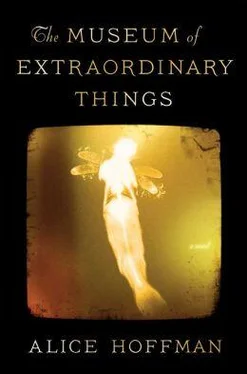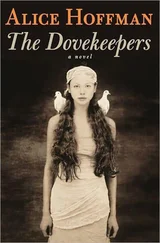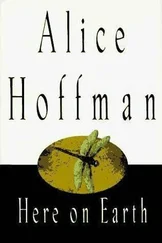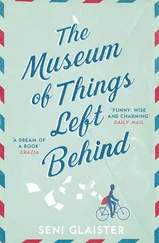This was before Dreamland was closed for renovations last year, in the autumn of 1910. All the same, the park was astounding even before the new attractions were added and all of the elegant icy white buildings were painted. I remember passing through the massive gate for the first time, stunned to see the gigantic biblical sculpture called Creation, an enormous winged angel. I couldn’t take my eyes from her. It was as if a goddess had fallen from the sky onto the shores of Brooklyn. Though I knew it was a betrayal to be so in awe of our competitor, I had never seen anything so beautiful.
There was a tower in which thousands of lightbulbs had been installed, and the night above the park was so lit up that I sometimes feared my father would be coming home from his evening out and spy me walking along. I took to wearing a black shawl to cover my head so I might fade into the dark. But underneath the shawl my hair was unbraided, and I let it fall down my back.
Our museum was tiny and old-fashioned, a minor diversion, not a grand, heart-stopping display. I awoke each day to the scent of formaldehyde and mothballs and a schedule of dull housework as I helped Maureen with the ironing and cooking before the museum opened for business. I helped to feed the birds and watered the neglected cereus plant.
My hours in the tank had become a chore. I often curled up at the bottom dozing until my father rapped on the glass. I knew I was meant to turn this way and that, posing, and to smile through the waves I created when I splashed my tail. I was not to show my teeth or make rude faces. Each morning I coated myself with olive oil as Maureen suggested, so that my skin would not dry out and crack, as if I were another tortoise kept in the hall of science. Each night I dreamed I wandered the streets of our neighborhood until I found myself at the fish market. I was there buying haddock and clams when I realized people were laughing at me. I looked down to find I had no legs. I had not forgotten the entertainment my father had been most famous for before he came to this country, the display of cutting a woman in half. The trick haunted me. I knew I would be a far better fish if I didn’t have legs. Then I would be caught in the net of my life, unable to climb out the window at night, unable ever to run away, fated never to see the true wonders of the world.

There were such huge crowds on summer evenings in the streets of Coney Island that no one noticed me, a plain girl in a black dress and gloves, my hair the color of ink. I visited Luna Park and the other, smaller entertainments. But I preferred Dreamland, perhaps because I could see its brilliant tower from my bedroom window. The park had become a part of my dreams before I ever walked through the gate. I went to every attraction and still couldn’t get enough. The one entertainment I avoided was the sideshow that fronted the park, for it reminded me too greatly of my father’s museum, though he called our human oddities scientific entertainments and living wonders and the sideshow’s term was freaks of nature. The Queen of Fatland was one of the star acts at the Dreamland sideshow, and was said to weight 685 pounds though her height was not more than five foot two. I had seen the Queen off-season, shopping at the same fish market I frequented on Neptune Avenue. Her real name was Josephine, and she once gave me a recipe for bluefish fillet boiled with rosemary and sliced potatoes. The Queen was originally from Minnesota and now lived with two sisters in Brighton Beach, a very respectable neighborhood. She told me that my father had once offered her a position at the museum, but she was paid far more by the owners of Dreamland and, more important, she was treated with respect.
“We would have done so as well,” I assured her.
The Queen laughed and patted my head, as if I were truly still a child. She wore enormous felted hats decorated lavishly with ostrich feathers. The bodices of her gigantic silk dresses were encrusted with rhinestones and pearls.
“Honey, do you know your father’s reputation? He’s as cheap as they come.” She might have said more, but she backed off with a sigh, perhaps because I was a young, impressionable girl. “However, he’s your father, so you think whatever you’d like.”
The Queen sang opera in the sideshow, favoring exquisite Italian arias. She told me there were men who fell in love with her at the moment they first heard her voice. I waved when I saw her on the evenings I passed by, but I had no interest in attending her performances. I wanted nothing more than to watch the crowds of everyday people, who seemed far more interesting and unpredictable than the living wonders I knew. The human curiosities who took their breakfasts of apple fritters and doughnuts on our back porch had come to seem no more mysterious to me than the moths that hovered over the cabbages in our garden. The men who ate fire and contorted their arms and legs into rubbery shapes spent their downtime playing cards at a table under the pear tree, like ordinary workmen. The women with too much hair or too little flesh changed into their costumes in the kitchen, revealing their frayed undergarments, asking me to fix cups of milky tea.
At Dreamland my favorite pastime was to stand in the shadows of the huge ballroom built above the iron pier and watch the lovers dance. They were so beautiful, each one unique. The music was the latest Enrico Caruso, so romantic and lovely, and Frank Stanley’s popular song “I Want What I Want When I Want It.” The ocean glowed in the light of the stars, so many hanging above us in the dark that no human being could ever count them all. The everyday people who attended the park screamed in metal carts that were flung down the Chute the Chutes. They kissed in dark corners. Many of them lived as if the world was coming to an end that very night, raising their skirts, making love to strangers, begging to be scared out of their wits and thrilled to their very core.
The season I haunted Dreamland was the same summer I borrowed Maureen’s copy of Jane Eyre. I wanted to read it for myself so that I might understand the depth of Mr. Morris’s passion for this tale. Maureen said I could only have access to the volume when I was with her, for she was so protective of the book she kept it wrapped in brown paper to shield its cover. Just as well. My father didn’t approve of women authors, and he most assuredly would not have approved of Miss Brontë. I had to admit, the novel confused me. I knew I was supposed to have sympathy for the main character, the orphaned Jane, who was near my age and all but friendless and whose name I took for myself on the nights I wandered off on my own. Yet it was the madwoman locked in the attic who held my interest and compassion. I could understand how Mr. Morris might have been so radically affected by the madwoman’s story he had run away the very night he finished the book. I thought if I ever fell in love, I would want my beloved to wish what I had come to wish, that the book had ended differently, so that the first Mrs. Rochester might have made her escape.
“Is your heart broken?” I asked Maureen the day I returned the book to her. The Wolfman had been gone for more than two years. After his departure, Maureen had suffered from bouts of melancholy. Her eyes had been watery and red, but she blamed her reaction on the tang of the spring onions that grew wild in our yard and all over Brooklyn. I had no idea that Mr. Morris had recently found his way back to Brooklyn, and was secretly living only a few miles away.
Читать дальше













